We found Imsouane by accident. I found some exciting words written about “surfer’s paradise” “beautiful fishing village”, and there was some highly rated accommodation on Hotels Combined. Imsouane sounded cool – fishing village and surfer’s paradise. I booked five nights, thinking it was a nearby satellite of Agadir. Only a few days before the trip I discovered that Imsouane is about 200 km up the coast. No problem. At least it was in the right direction!
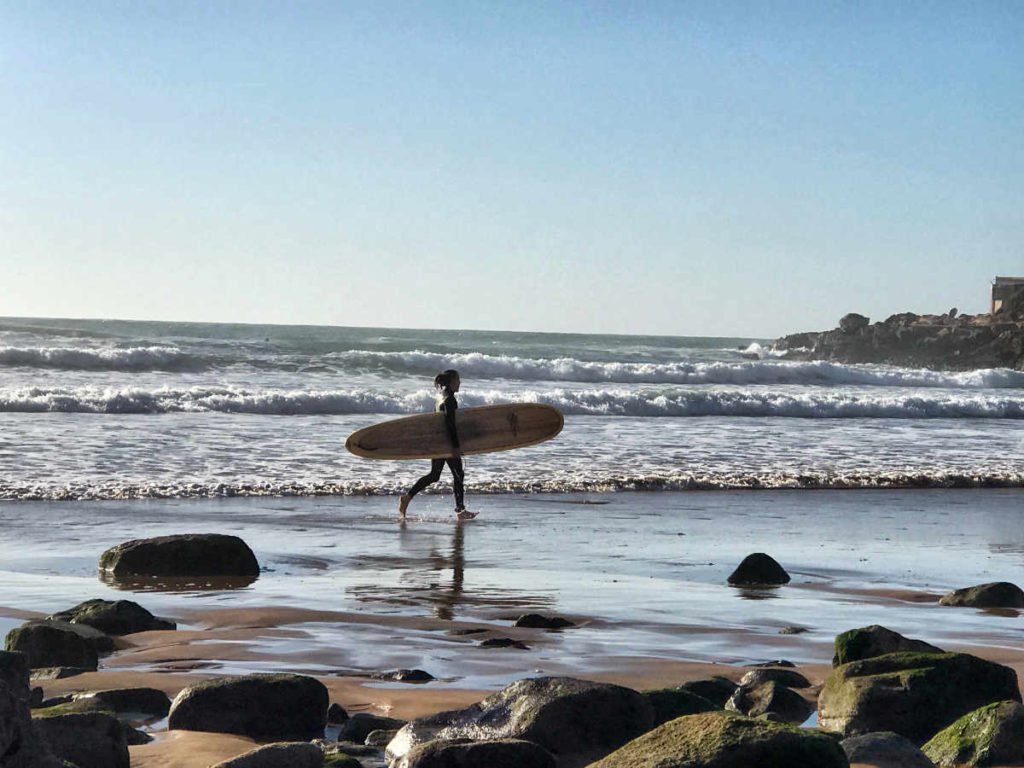
As it turned out, we loved Imsouane, and it was a real wrench to drag the girls away after a week there. But that wasn’t our first impression of the place. It took a couple of days for it to get under our skins.
The Journey to Imsouane – Agadir Airport, SIM cards, Taxis and ATMs
We arrived in Agadir. Agadir airport is not a place of beauty. But who cares if you see a beautiful sunset and you feel warm – we had boarded in a blizzard at Manchester.
We spent some time at passport control. Logically we had queued behind a Muslim family thinking that locals would get through faster. Silly error! The woman took a lot of persuading to lift her veil for the officer to recognise her . . . Surprisingly covering for muslim women in Morroco is not obligatory – some women do, others decide not to.
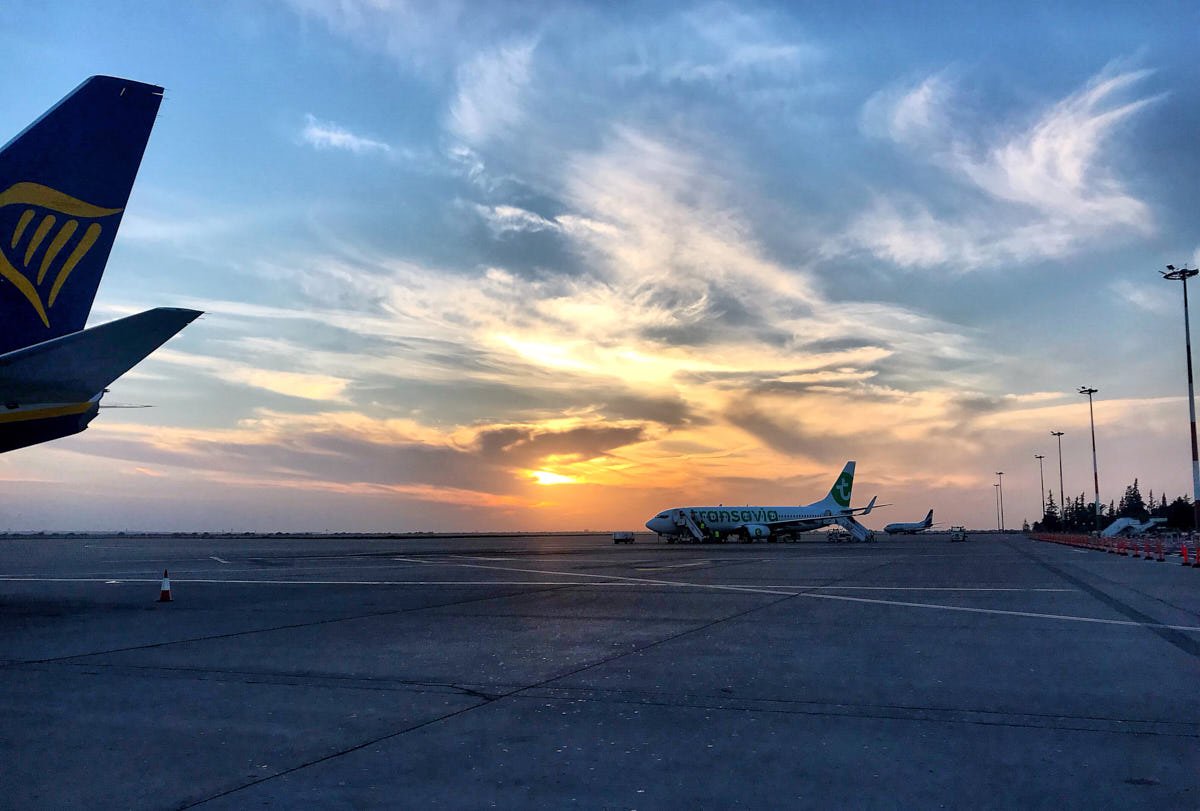
Waiting for our luggage we were approached by young ladies selling sim cards. We refused – assuming that one should buy a SIM card in an official kiosk in the lobby. However when we got to the lobby there was no kiosk and noone selling SIM cards – in general in Morocco it only ever seems possible to buy them from random vendors. Credit (“recharge” however is available at fewer places)
Another lengthy stop was when we were asked to x-ray our luggage and then had to show all my photo equipment. By the way, the customs officers didn’t find my drone, because I had done my homework and knowing drones aren’t allowed I left my toy at home. We did however succeed in importing some Polish pork sausage which the girls had in their bacpacks.
Btw If you leave Agadir airport building you cannot come back so if you need a pee, better think about it before leaving the airport.
Transfer to Imsouane
Having discovered that Imsouane is not a suburb of Agadir, I had contacted our accommodation and on their advice, booked a transfer by Grand Taxi through them.
Our friendly driver, Rashid, showed us to a not-terribly-antique vehicle parked on a side road that didn’t look at all like an airport carpark. We found and fitted the girls’ mifold seats in no time, and we drove off into the dusk. The journey took about two and a half hours, mostly because of the Agadir traffic.
En route, Rashid called our host. He handed me the phone, and I learned that we should get money and food on the way. There are no ATMs or late night shops in Imsouane. So we stopped again to get enough to pay for both the taxi, the lodging, and weekly shopping. Owing to our dietary needs, I had already brought plenty of food to get through the night.
Imsouane – First Impressions
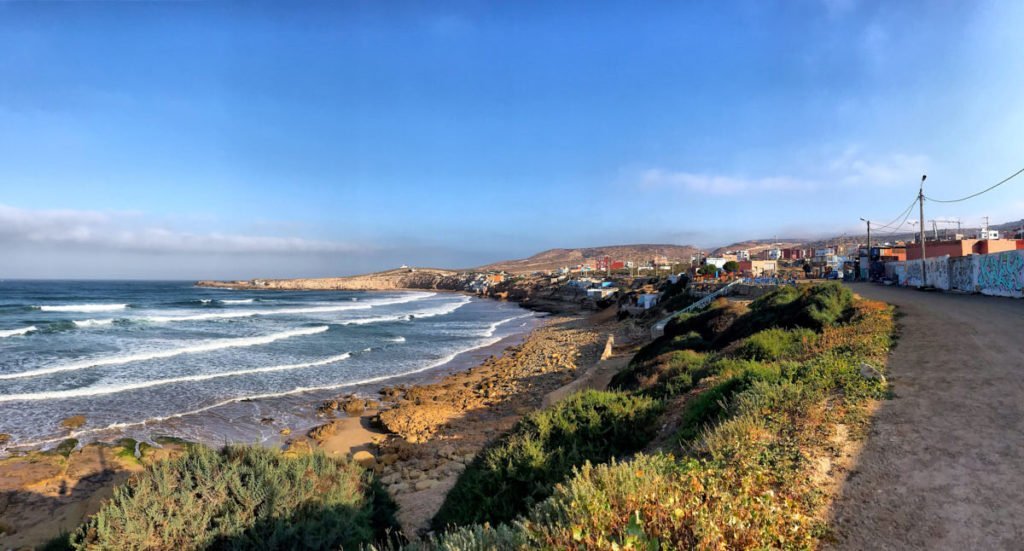
According to the 2004 census, Imsouane has a population of about 9,000 people. To me, it feels as if 900 would be more realistic. The main town is set out as a gridiron of half-developed house plots. Rendered and balconied three-storey houses are interspersed with rough scrub, gravel and boulders. Many of the houses are still being built. Almost none of them seem to be occupied. Stray dogs wander around. Yes, our first impression was that this is a place best described in words unsuitable for a family-friendly blog.
Imsouane Growing Affection.
On our first morning, we walked out from the gridiron of streets and joined a gravel path which led us through a small scrubby wilderness. By now, a couple of dogs had adopted us, so the kids immediately named and befriended them.
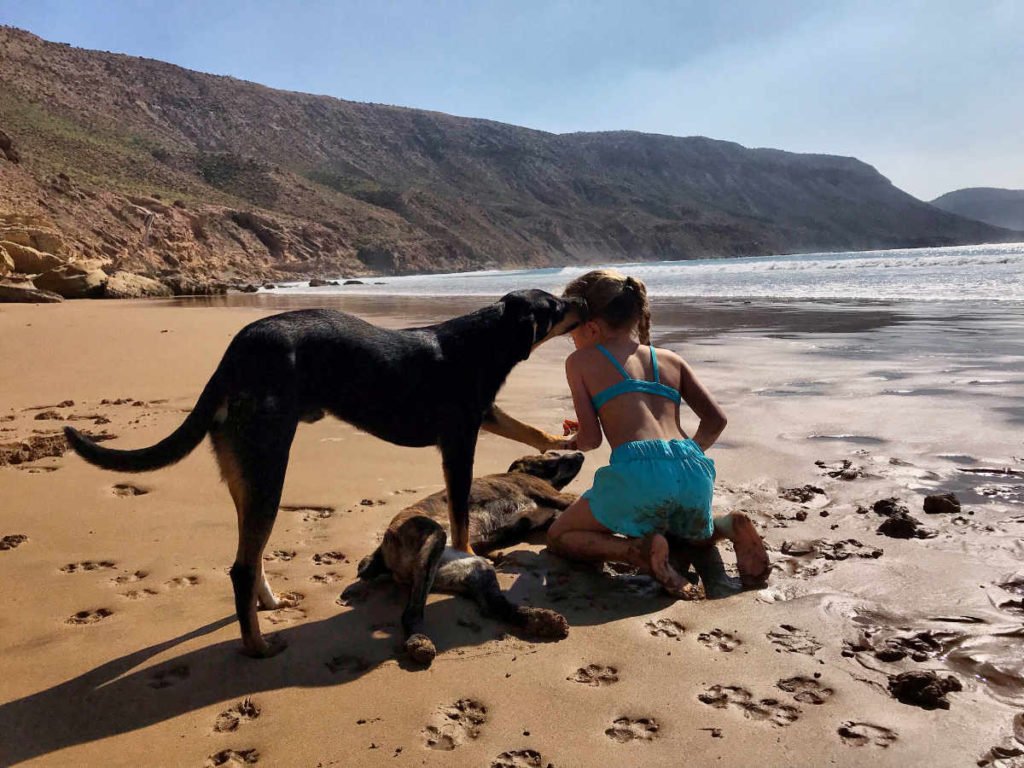
The path emerged at a hopscotch pitch painted on a concrete pavement, and we found ourselves beside a tiny shack standing on its own. Outside it, battered surfboards stood in a couple of racks, and there was an assortment of shabby skateboards. Potted cacti sat on painted wooden steps leading up to its open front. A broken surfboard informed us:
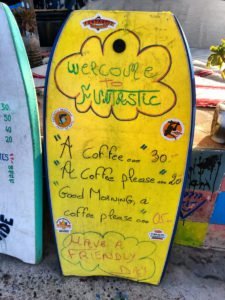
A Coffee 30 Dhs ($3)
A Coffee Please 20 Dhs
Good Morning, a coffee please 5 Dhs ($0-50)
A friendly face emerged and wished us well. There was music playing.
Imsouane Town Centre
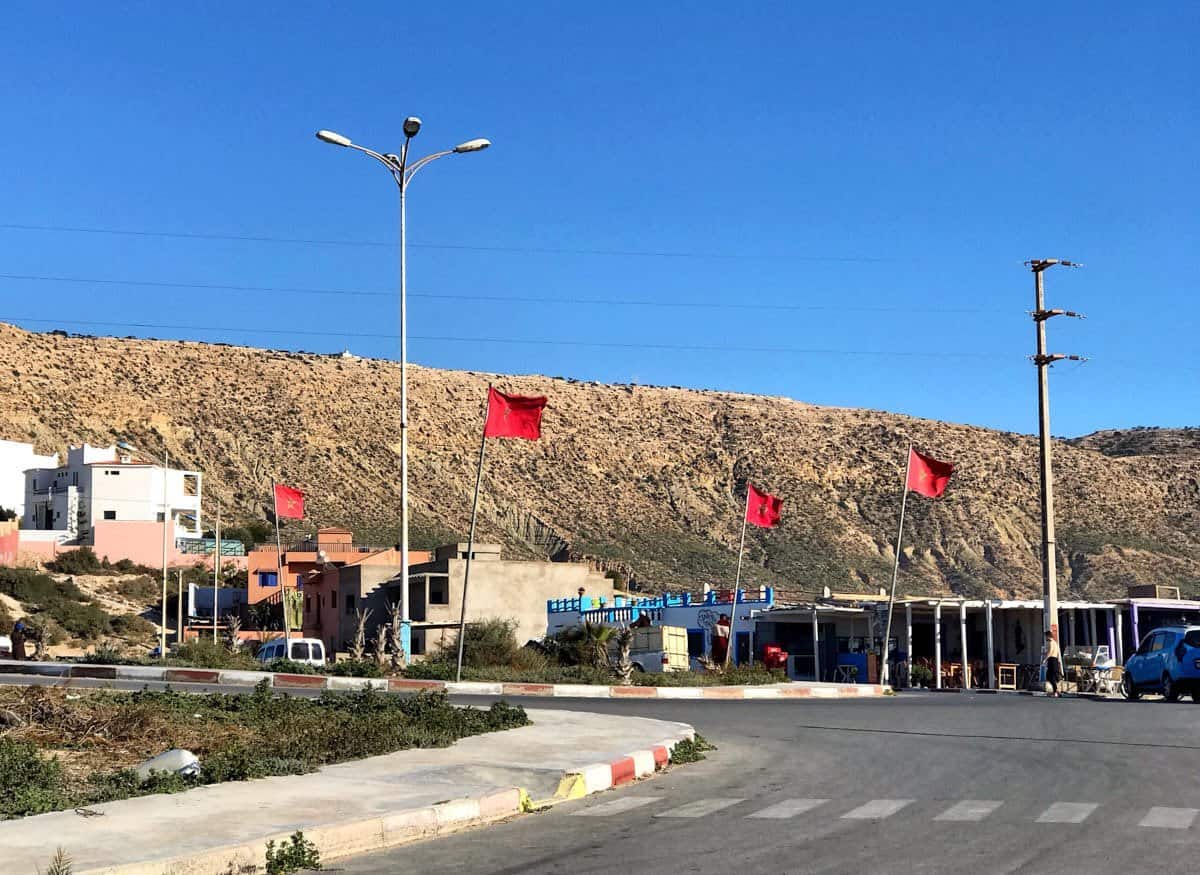
We made our way down to the town roundabout, which seems to be the centre of the village. Four tattered Moroccan flags fly above it and a guy in an old brown anorak practices skateboarding. He seems to be as much a permanent fixture as the flags, though sometimes he plays football with oranges.
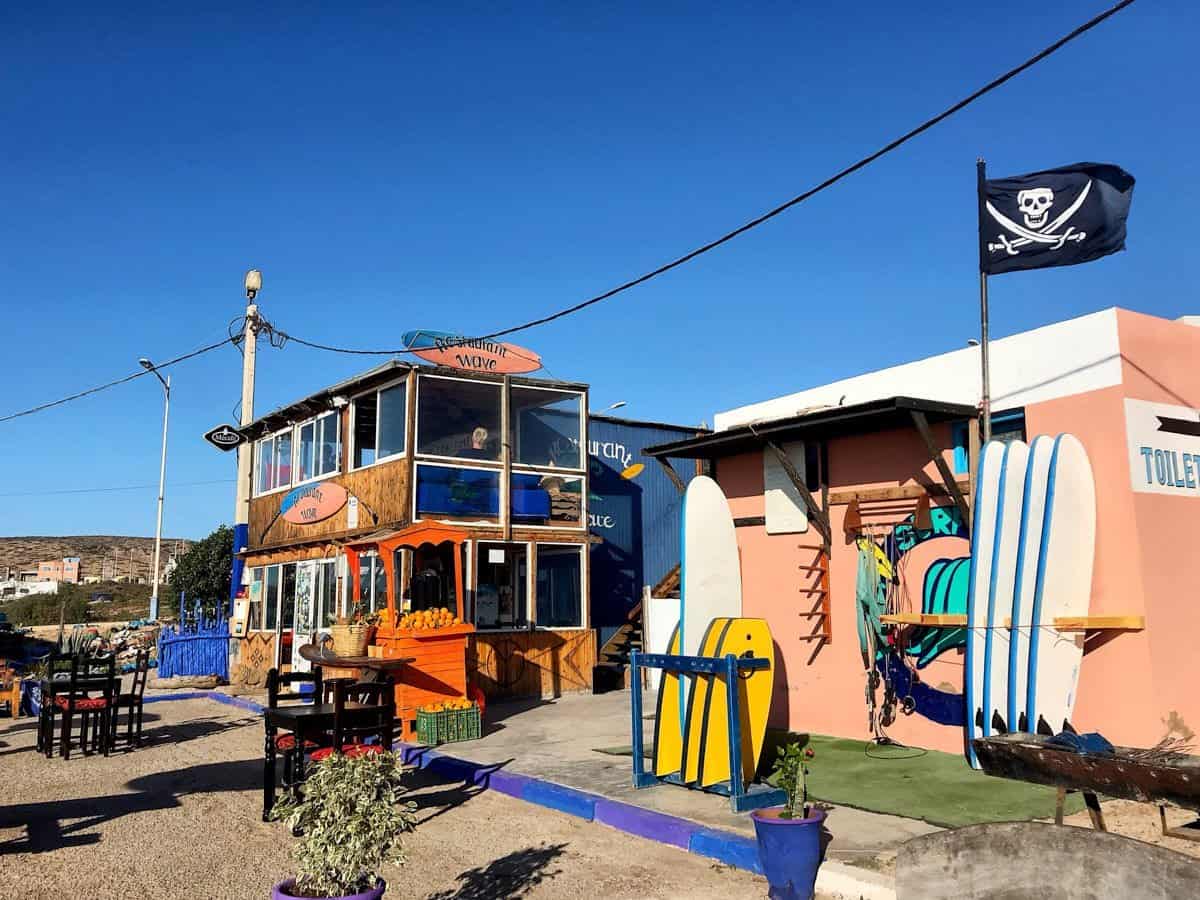
We were now entering the commercial end of the town near the tip of Imsouane point. Little shops restaurants and cafes occupy wooden shacks. Tiny mud and stone buildings proclaiming themselves to be hostels are built into the southern edges of the head and look out over the bay below. Their white painted walls are decorated with graffiti. Despite its ramshackle appearance, the place has an upbeat businesslike character. All the proprietors greeted us warmly with no hint of pressure to enter or buy, but when we did, we were well served. We had a second breakfast at the Wave Cafe, which dominates the main square on the point.
The square is a patch of beaten soil the size of half a football pitch. To the west, it overlooks breakers crashing in from the open Atlantic. A stone villa, now a surf school sits behind a courtyard wall to the north. On the other two sides, single storey painted timber hutches proclaim themselves to be surf shops, creperies, “douches payants” cafes and photography studios.
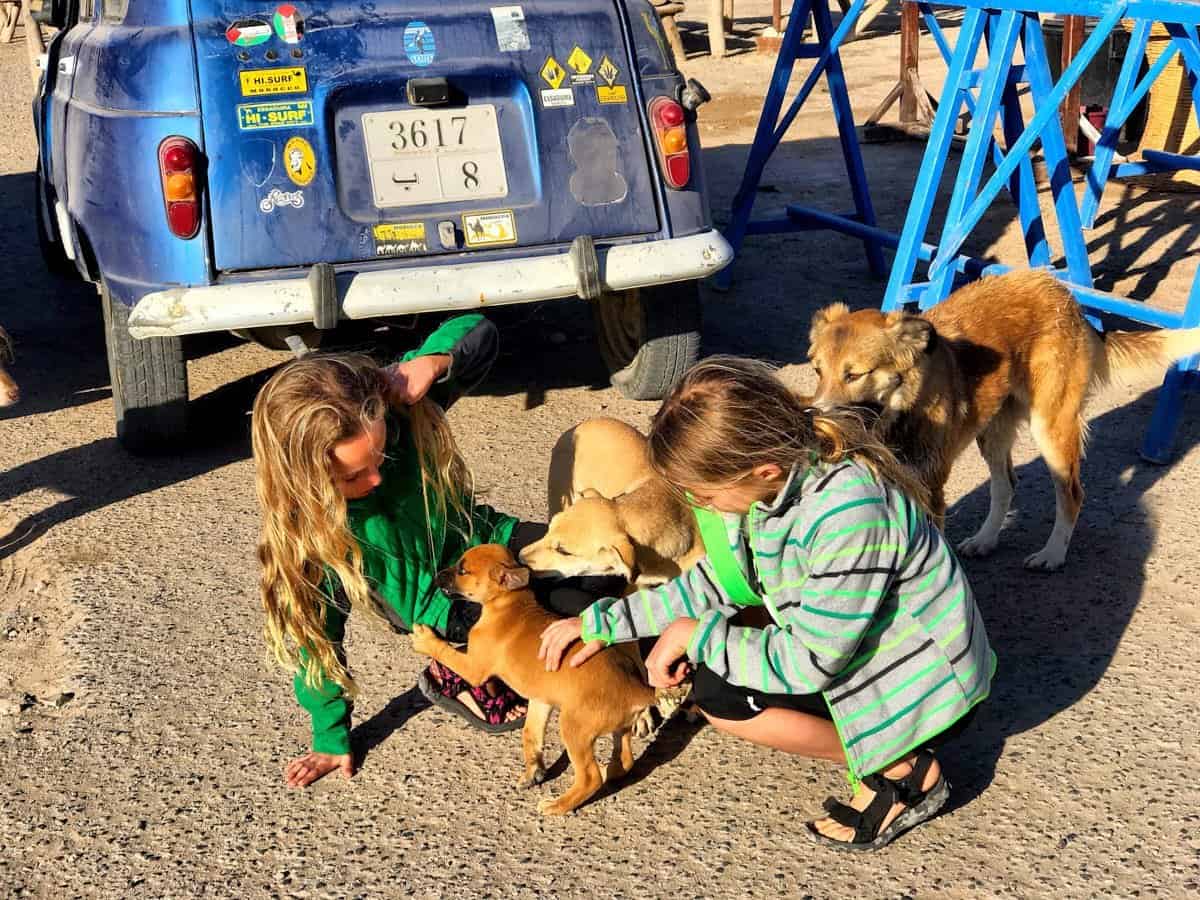
More stray dogs came to greet our girls and receive names and hugs. This place feels positive and very much alive. There is a garden of small plants and cacti between the square and the roundabout. It is beautifully arranged and maintained with painted fences and ornamental stones. A yellow-painted surfboard with a cartoon sharks-bite taken from it stands on end to announce the entrance to the cafe. A man is hand-painting white lettering onto the intense dark ultramarines and purple surfaces of old plant pots. Waiting staff spend their spare time sweeping up or sprinkling water to dampen the dust.
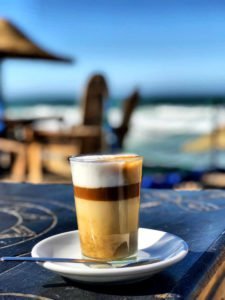
We enjoy sweet freshly squeezed orange juice and the best coffee we have had since we were in Costa Rica. (12 Dhs).
We are sitting on rickety chairs at a table to match and under the shade of a straw parasol. We are on the edge of the square, looking out to the West. Five metres below us is the beach, a group with surfboards are exercising on the sand, in a pretty disciplined way. Most of them are wearing red jackets, and it seems that we are watching a surf-school class. Others are already out in the waves, and the group soon paddles their boards out to join them. This is what this place is all about.
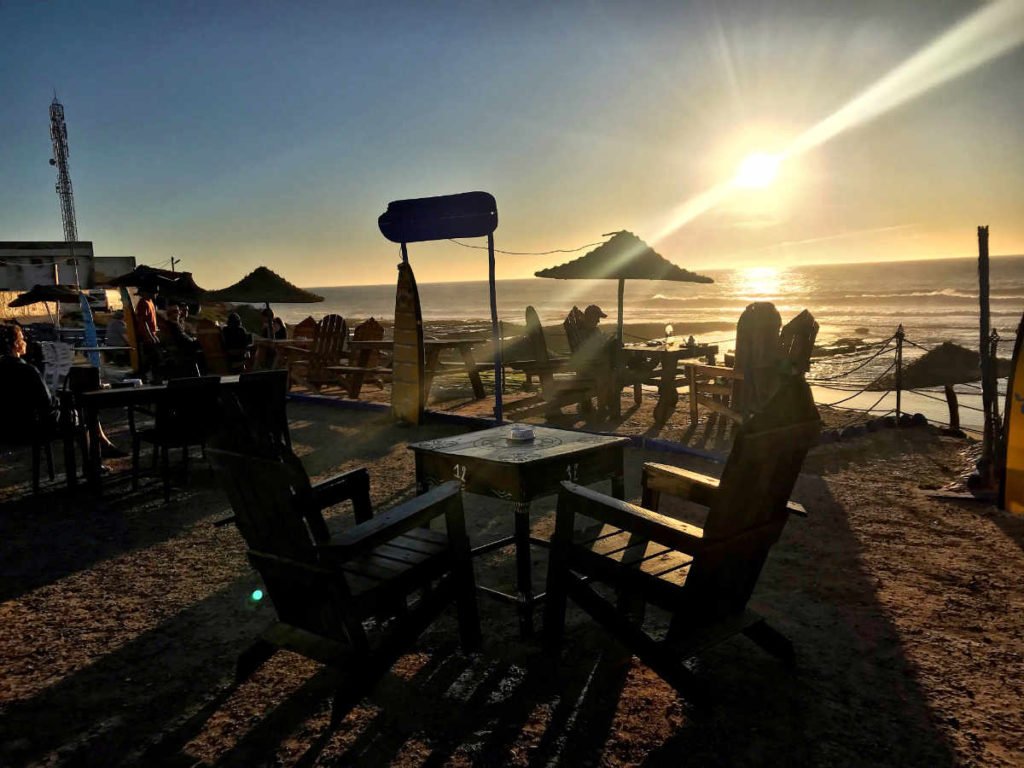
Surfing is the subject of beautiful and striking graffiti which adorns most walls down here at the point and on many buildings elsewhere. It seems to account for every one of the tourists here except us. Apart from a toddler in tow of a dreadlocked couple, our kids are the only children in the place. We are the only people who go walking and playing on the beach. Everyone else shares a mission of balancing on moving boards. They have a kind of intensity, and they create a buzz of excitement in the whole place.
Fishing Port of Imsouane
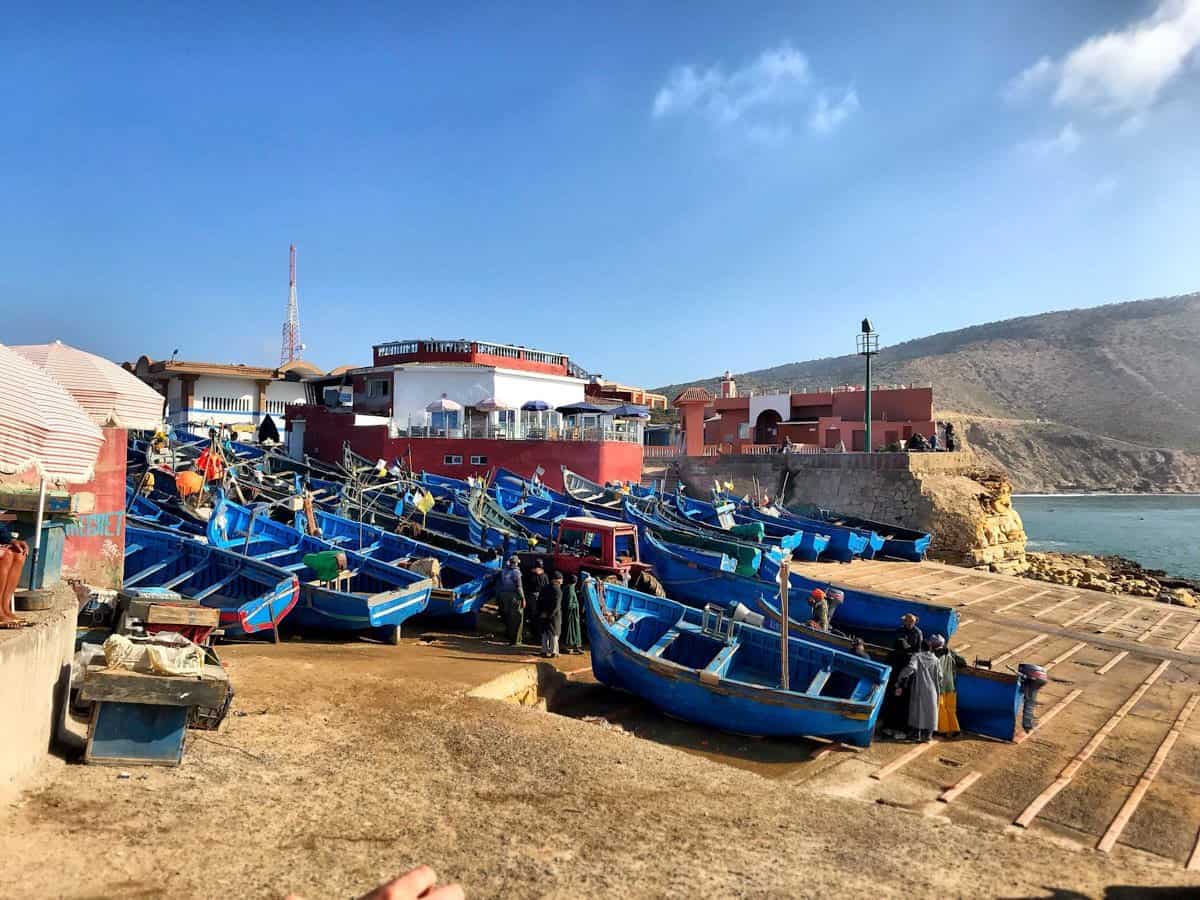
South of us on the point is the new fishing port with its breakwater protecting a new harbour. There is a fleet of maybe a hundred solid wooden blue-painted boats, all safely beached. The dry harbour is within a courtyard dedicated to the messy, smelly business of fishing. Beyond this is to the south is the second beach, It is a couple of miles long, and located in a bay. According to Google maps, it is touchingly named “Plage d’Imsouane 2”
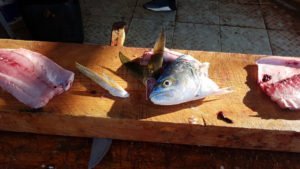
The near end of this beach faces south and is shielded by the breakwater from the direct force of the Ocean. The breakers still find it though as they curl around the head to reach the shore.
They are strong enough to surf when the tide is coming in, and they seem to be more regular here. It is January, and this beach appears to be more popular with surfers than the western beach called (you guessed it) “Plage d’Imsouane 1”
Imsouane Bay
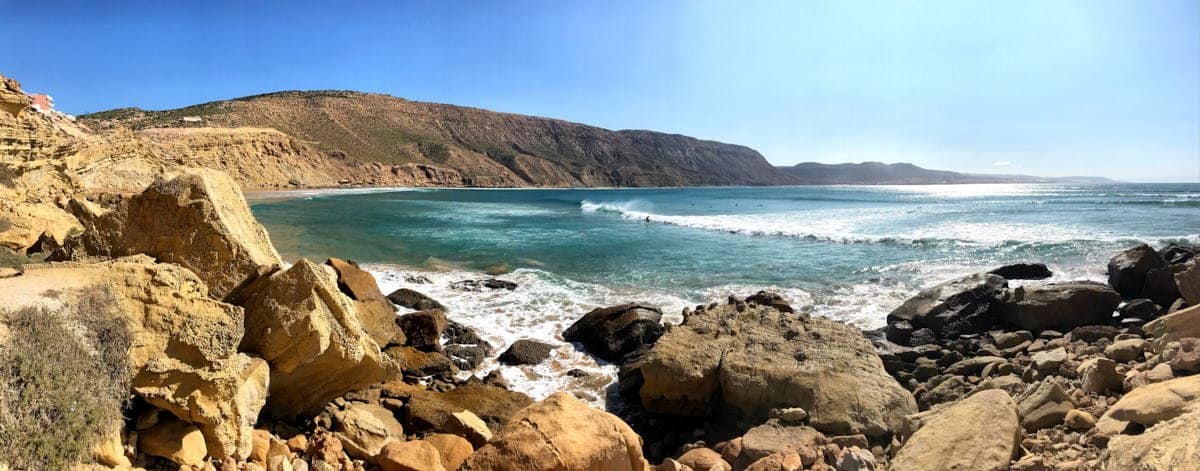
As we gingerly climb down the sandy rocks to the second beach, we see how this place is set up for agile people. Surfers are scampering over precipitous rocks all around us. Each of them carrying two and a half metres of surfboard under their arms or on their heads. The path to this beach is even more difficult when the tide is in. Now there is no sand within 300m of the harbour, so you wind around the clifftop beside vertiginous drops. Then descend a 4m steep concrete stair unguarded on both sides.
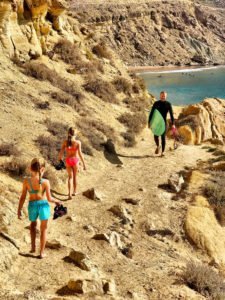
Trek another 200m along the tops of boulders which have tumbled (how long ago?) to the base of the cliffs. And you arrive. The beach is beautiful, long and clean. It’s great for sunbathing and sandcastles. The sea is a little rough but warm enough for paddling and swimming.
The kids loved it. They have never had such an adventure getting to the beach and back!
Having discovered all this, we felt that we knew the place, but each day we were there we found more.
Food Shopping in Imsouane.
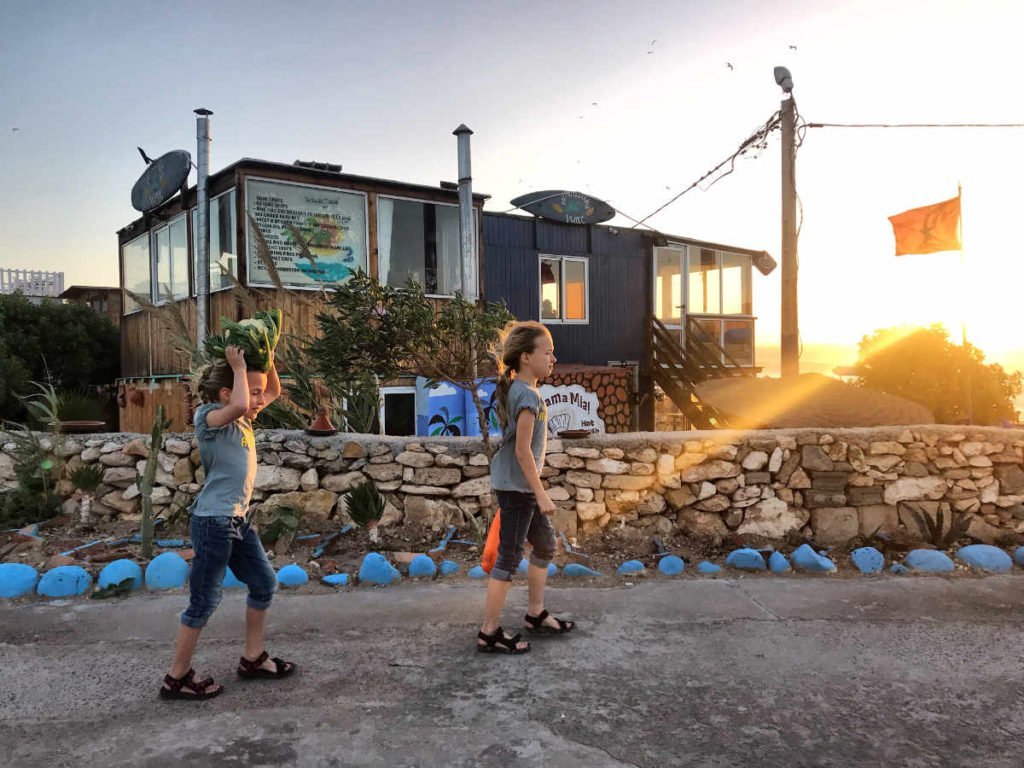
It is easy to eat very healthily in Morocco. Market stalls selling fresh fruit, vegetables, herbs, eggs and fish are everywhere, and the food is fresh and cheap. Except in Imsouane. There is no market here other than the fish market and food isn’t cheap here. Having said that, the shopkeepers are friendly and the fruit and veg fresh. They sell free range eggs as well as battery eggs. The only fresh meat is chicken. The one time we bought one, the guy had dropped it on the floor twice before we took it away. It wasn’t so good either. On the other hand, a seabass from the market was delicious. We just rubbed a bit of salt on the fillets and barbecued it on charcoal bought from the general store.
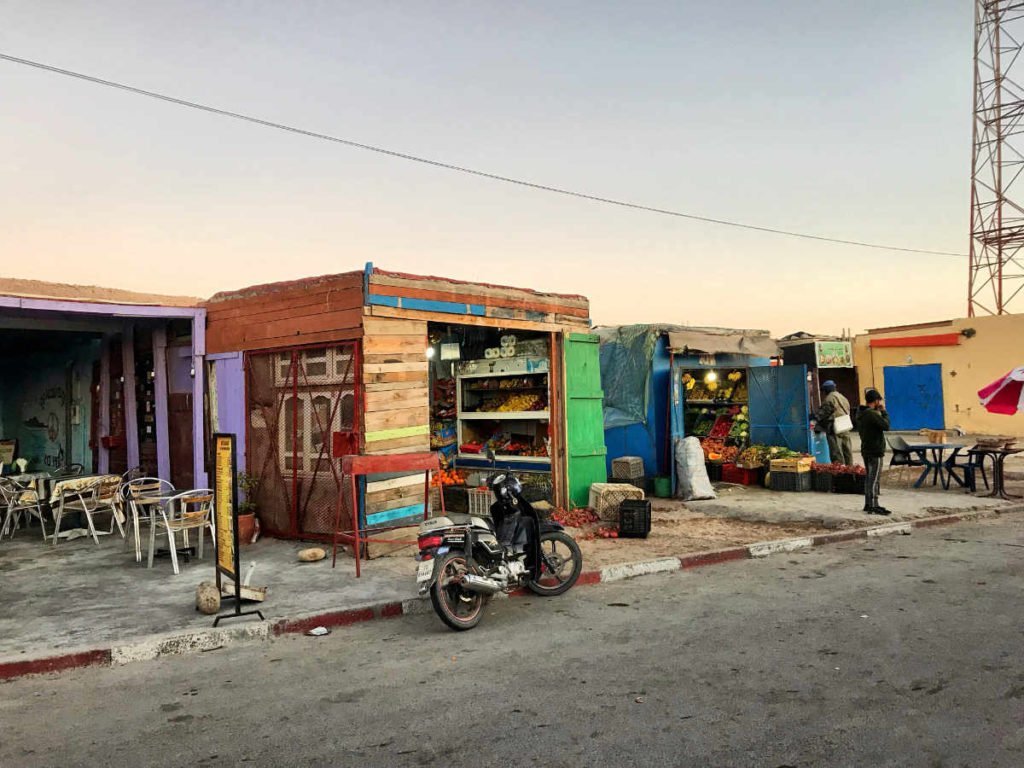
Discovering more of Imsouane
Other than a very few buildings facing south from the harbour headland, all of what we had seen was new. By that, I mean that the buildings are square and sharp-edged. There are none of the soft rounded shapes of stone and adobe built in timeless ages before buildings came to be designed on paper.
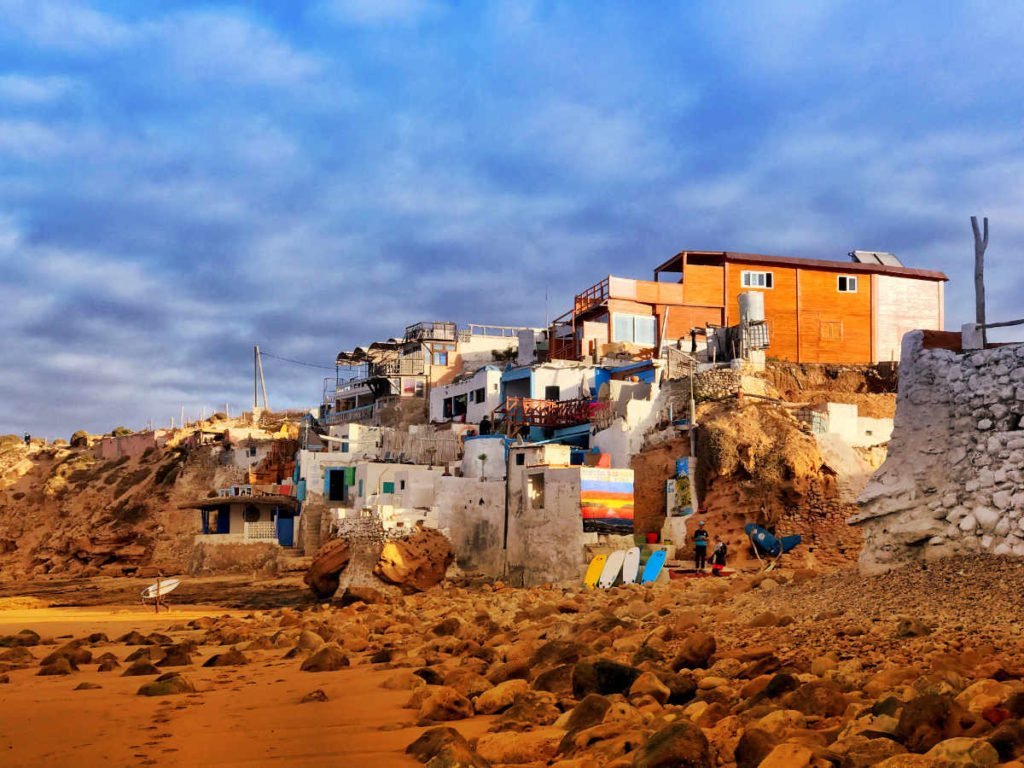
One day we went for a walk to see the surf camps and found what must have been the old fishing village at the north end of the west beach. Still very much alive, the buildings are repurposed as quaint surf hostels and balconied cafes. The fishing harbour is alive too. It has just been relocated to the point.
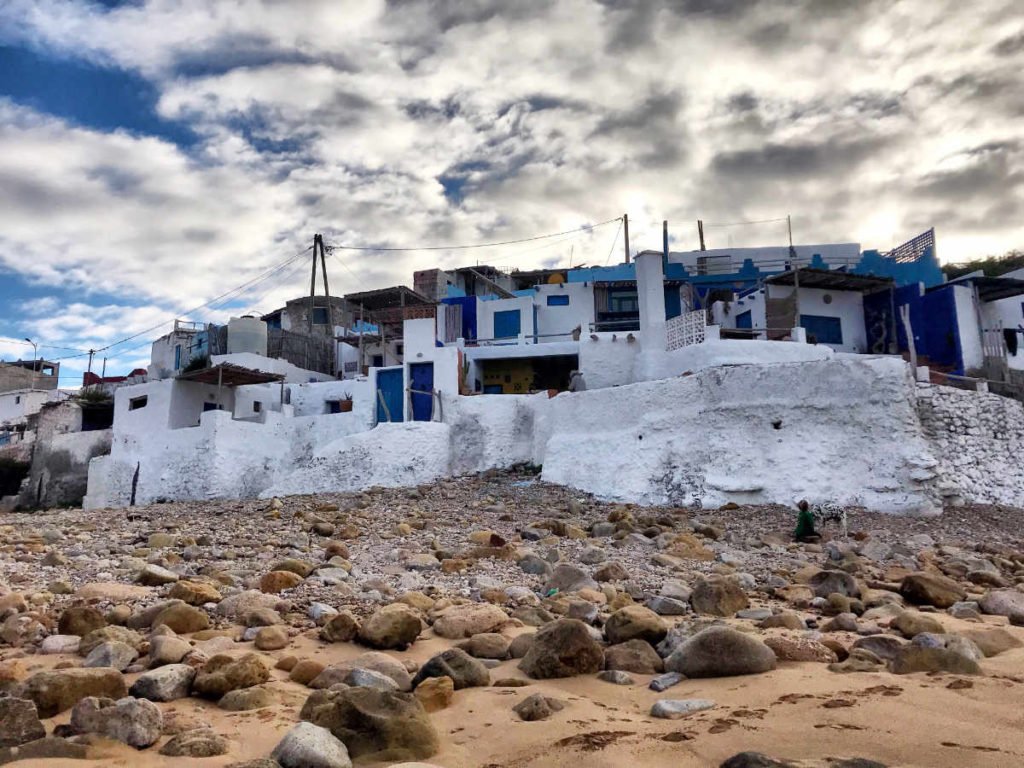
In this lovely place, timeless buildings tumble down both sides of a small valley and then wrap around onto the face of the rocks to face the ocean. For some reason the buildings on each side of the cove are different. Those on the north of the valley are multicoloured. They look like a random pile of painted boxes cascading down the bank. On the other hand, those on the south side are white-painted with ultramarine and cobalt blue details. Each side is equally picturesque but quite different.
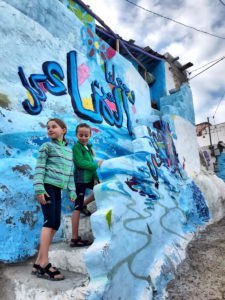
Surprisingly these houses come almost down to beach level. The surf here is rough, and at high tide the water comes right up to within a few feet of their front doors. Do they never have freak storms here to destroy such buildings facing the front? In one place a little patio complete with parasol stands defiantly on top of an enormous round rock lying on the beach.
The Beauty of a Windy Day in Imsouane
We walked on along the west beach. It was a windy day and we saw colossal spray breaking over a headland to the north. Some of the waves threw up plumes of water two or three times as high as the cliff. The next day it was even windier so we took a walk to see if we could get a closer look at the fierce impact of water and rock.
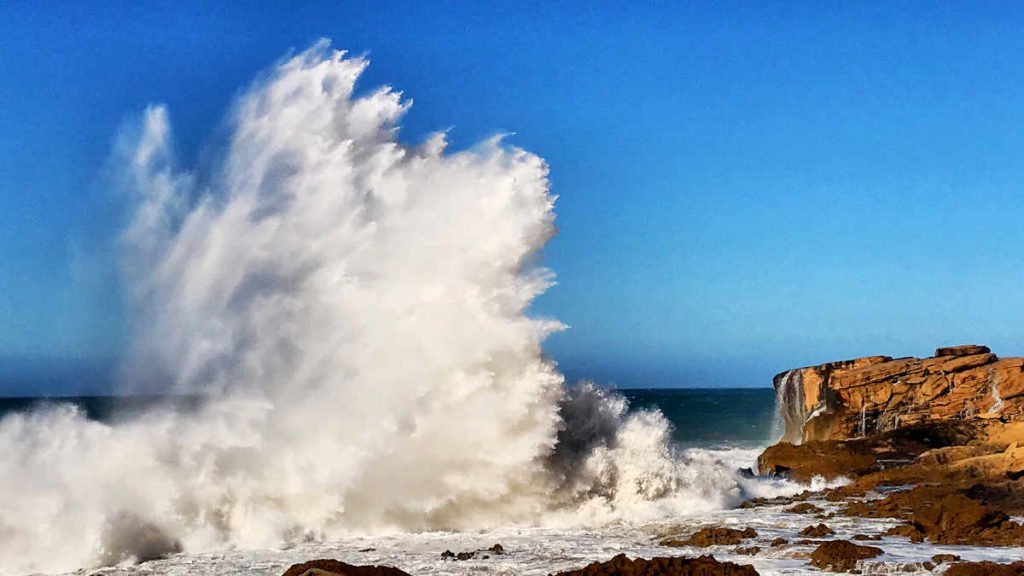
Out on the headland, we found a small abandoned building, again tucked into the face of the land. From the narrow pathway in front of it, we found ourselves witness to the tremendous power of the crashing surf on nearby rocks.
Again it was a strange feeling. We were almost close enough to touch breakers throwing spray 20 metres into the air. And yet, none of the waves broke over the rocks in front of the building where we were standing. They were, however, breaking over much bigger rocks another 50m along the coast. Each big breaker threw so much water onto the rocks that waterfalls ran off them for maybe twenty or thirty seconds as they gradually drained.
Rural Imsouane
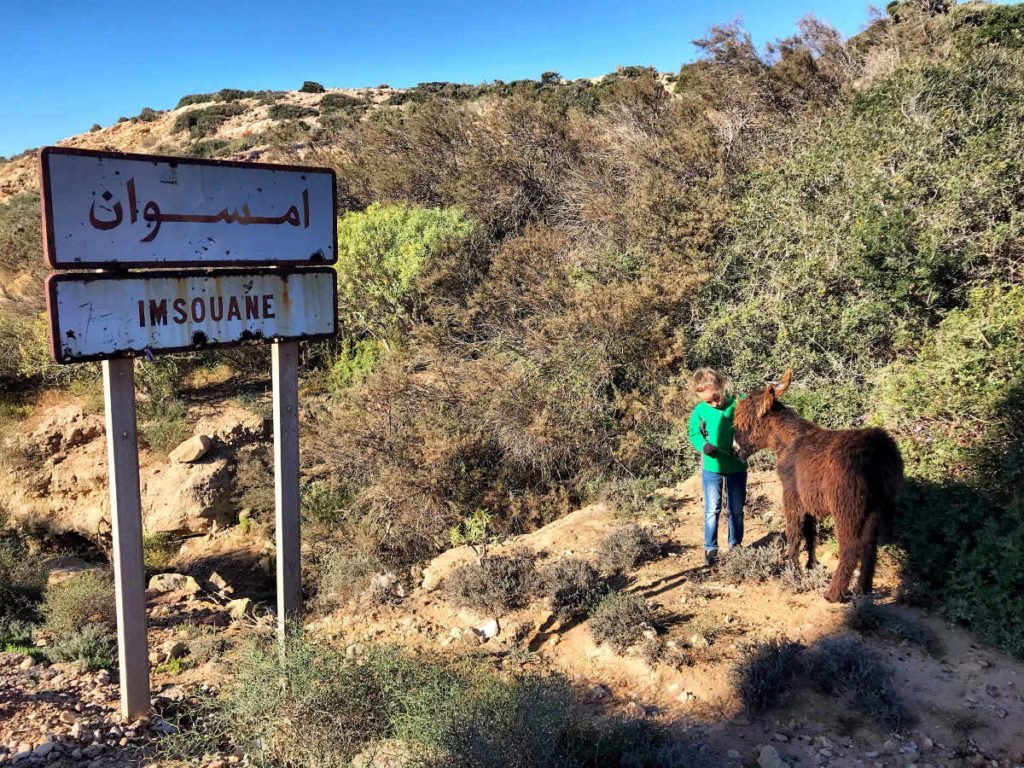
Another day, we took a walk out along the only road from Imsouane other than the one where we had arrived. After we met a friendly donkey near the Auberge Tasra, the road twisted about as it gradually worked its way up into the hills. We walked on for a couple of miles until we came to the pass. The jebel top is quite accessible there. We climbed it and were suddenly presented with a beautiful 180-degree prospect of the Atlantic rolling endlessly to the shore. We picked up some fossils and made our way back to the village having discovered yet another beautiful angle on this place.
Day by day Imsouane continued to work its way under our skin, always revealing new aspects to us.
What You Should Know when Planning a Trip to Imsouane
- No ATM – take enough cash with you for your accommodation food and whatever else you want to do.
- Winter temperatures around Imsouane are about 20 degC (70degF) in the day and 10 degC (50 degF) at night. The day feels warmer if you are in the sun, but it rises late because of the hills in the east.
- There are no food street markets. The shops are helpful and stocked with fresh veg fruit and eggs. Prices are more expensive than in other Moroccan town markets – similar to UK supermarket prices.
- There is a fresh fish market in the mornings as the catch comes in.
How to get to Imsouane
Hire a Car
You can hire car in Agadir airport. We haven’t rented a car this trip , but when we do, we we always book a car in advance using EasyRentCars. A tip about renting cars in Morocco, I picked up from other sources- Be careful to check for all scratches when booking the car out. Best to take photos.
Hire a taxi
Or take a grand taxi from Agadir, Essaouira, or Taghazout. Ours from Agadir cost 500 dirhams – about $50. Our grand taxi to Essaouira from Imsouane 400 dirhams ( about $40)
Go by bus
You can take bus from Agadir or Essaouira and get off at Tamanar and then take a Grand Taxi to the coast.
Imsouane – surfing
Imsouane is famous for having the longest waves in Morocco. Imsouane has two surfing beaches.
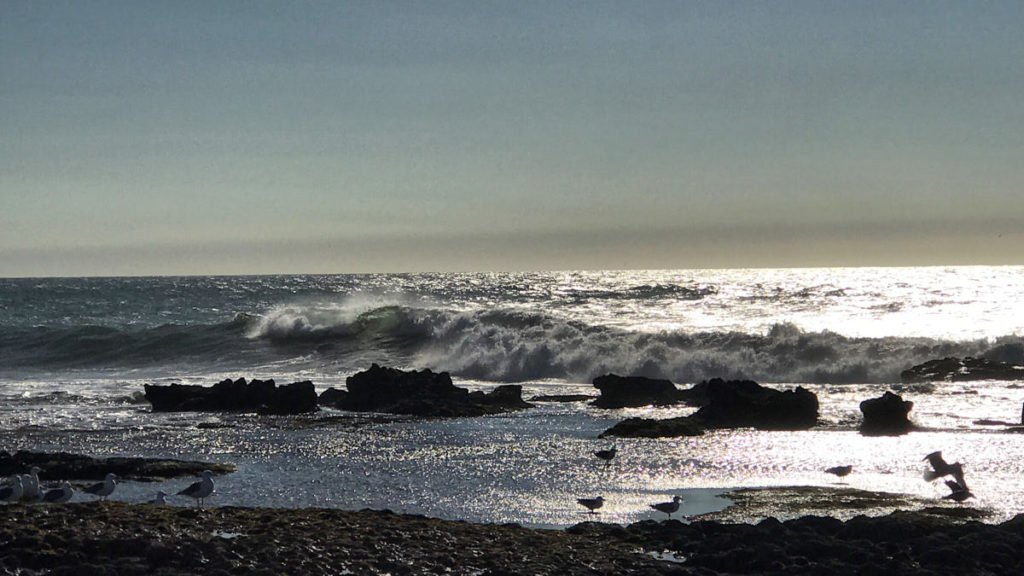
Beach No1 faces west – straight into the Atlantic – and is about half a mile long. It is bounded by the cathedral rock to the north and the new harbour point to the south. The surf is a beach break, and it looked pretty wild when we were there in mid-winter with waves of up to 3 metres.
Beach No 2 is about two miles long. It faces south near the new harbour with a point break and then curves around to face west at the far end. The whole beach is in a bay. The surf here looked less fierce, and all the surfing action we saw was at the north end near the harbour.
Love Surfing – read Surf Quotes to Stir Your Inner Stoke
Imsouane Surf Camps
There are a few surf camps which seem to be the best option if you want to learn how to surf, or if you come to Imsouane without your surfboard. All surf camp stays include accommodation, lessons, food and equipment rental. If I would come to Imsouane on my own, I would for sure stay in one of the surf camps.
Imsouane Surf Lesson
Typical prices per person are listed below. All have qualified surf instructors, on appropriate surf for your level, and including all equipment.
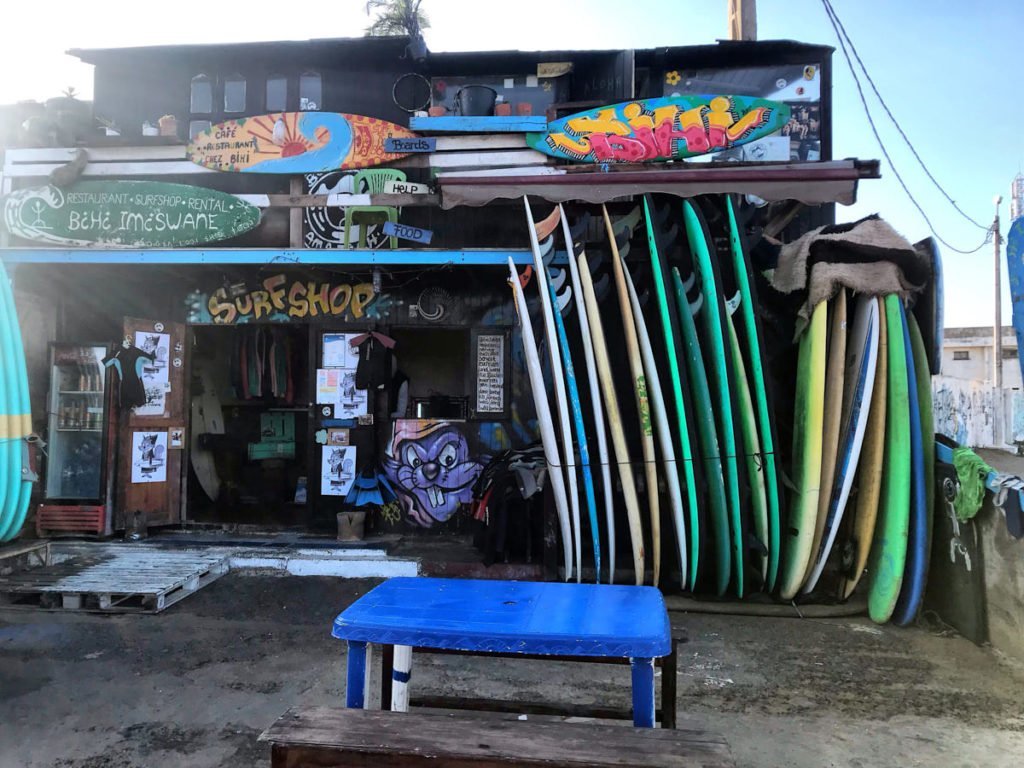
- Half day-$22 – 2-hour surf lesson plus warm-up session
- Full day $33 – 4 hours of surfing plus warm-up session
- 5 days-$135 – 4 hours surfing a day
Imsouane – where to stay
There are several options – it actually feels like the whole village is designed to serve tourists. There are few hostels, several apartments and one camping ground (Ocean Point Moroc)
The Auberge Tasra is the only place you would call a hotel and the only place with a licensed bar. It also has a swimming pool.
Imsouane – where to eat
If you are staying in a surf camp, you will have food included in your accommodation.
We stayed in a private rooftop apartment with a terrace, so we cooked for ourselves (including a fish barbecue one night on the terrace)
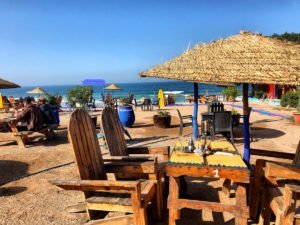
Otherwise, there are lots of cafes and small restaurants in the new commercial area near the harbour point. And more spread throughout the residential area of the town.
Imsouane Shops and Services
- There are two or three small general stores which sell fresh fruit and veg. – And probably everything else you might need.
- There is one butcher who sells only bony skinny chicken, and which may or may not have been on the floor before you buy it.
- The fresh fish market starts every morning and closes when the last fish is sold.
- There are surf shops with hire and repair facilities.
- There are local photographers who sit on the rocks with telephoto lenses so you can buy a picture of yourself at that wonderful moment.
What You Won’t Find in Imsouane!
- ATM
- Street markets for food (You can buy some souvenir bowls and tagines)
- People who accept credit cards.
- Meat other than chicken
- Alcohol other than at The Auberge Tasra bar
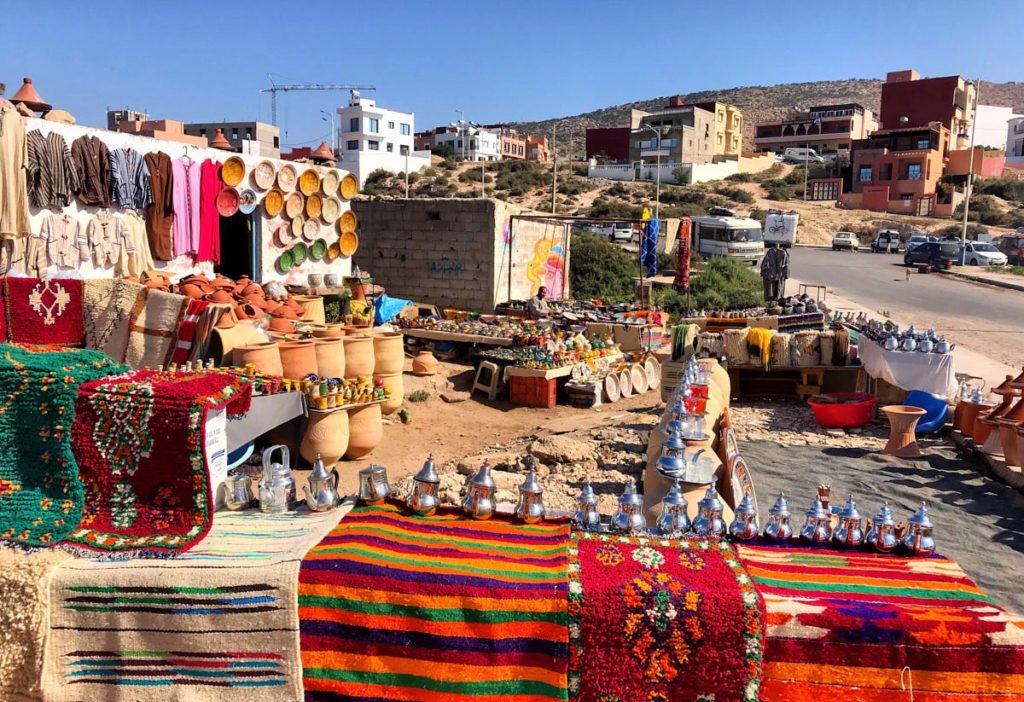
What to do in Imsouane if you are not surfing.
- Watch the surfers
- Go for walks and find fossils.
- Play with local dogs or cats
- Admire the Graffiti
- Sunbathe
- Swim
- Build Sandcastles
- Wonder at the Sea breaking on the rocks
- Admire the old and new townscapes
- Have a delicious coffee and chill.
Imsouane Conclusion
By the time we left Imsouane, we felt that we were the only visitors who had not come for the surf. We wondered why – there is so much else to enjoy. We all found it hard to leave… and maybe we will be back to surf when weather and water gets warmer
From Imsouane we went to Essaouira – here you can read about Things to do in Essaouira. Our next stop after that was Marrakesh.
Imsouane – Pin for later
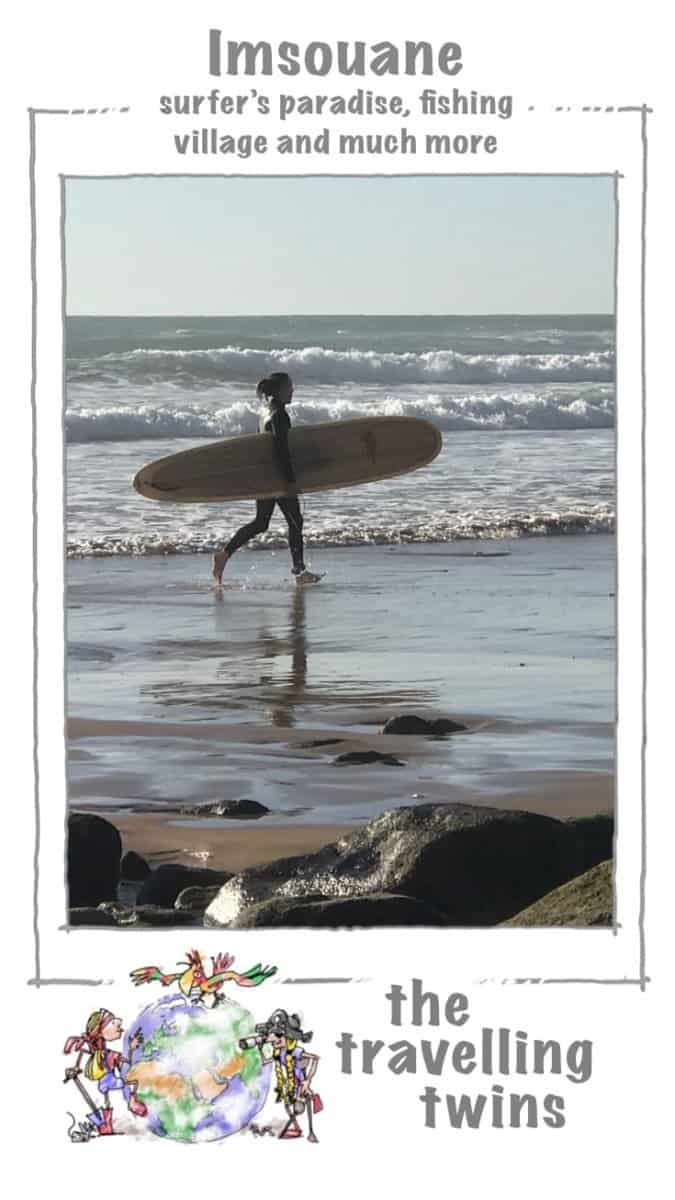
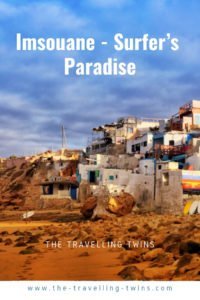

Looks like another miss😑- love that your girls names all the animals 🙂 we love seeing different animals in our travels too. Always an enhancement!
Wow another beautiful place! I have never heard of this place before, Looks like you guys are seeing so much of that area! Enjoy!
Trust me not many people know about this place, it was pure luck ending up in there
What a perfect beach town vibe here!! Looks beautiful!
If I knew how cool this place would be I would decided to stay there longer
So funny about the stray dogs, my kids would be in heaven! Love all the bright colors, especially the shots of the colorful fishing boats. This has me craving summer vacation!
It’s a good place for holiday – probably best time would be April and then September October. In February was still a bit chilly